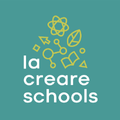We incorporate age-appropriate technologies that enhance learning and development. Our classrooms use light tables, STEAM kits, and other materials to engage students in active, hands-on learning. We do not use passive watching TV as part of our curriculum.
Our curriculum is designed to develop global leaders with a focus on Spanish immersion and a well-rounded education. We incorporate STEAM (Science, Technology, Engineering, Arts, and Mathematics) development and have strong programs established in music, gardening, math, and language arts. Our approach ensures holistic development for every child.
Project-based learning (PBL) is a teaching method where students learn by actively engaging in real-world and personally meaningful projects. In early childhood education, PBL encourages children to explore, ask questions, and solve problems, fostering critical thinking and creativity. For example, in our gardening program, children might plan and grow a garden, learning about plant life cycles, measurement, and teamwork along the way.
Student program placement is based on eligibility and the child’s age on September 1st of the enrollment year. Our programs include:
- Infants
- Toddlers
- Pre-K-2
- Pre-K-3
- Pre-K-4
Families interested in applying can complete an application online.
Yes, we offer a free trial class for our after-school and Saturday programs. Apply for a free trial and let your child immerse in the following opportunities: Spanish tutoring, gardening, cooking, science lab, and soccer.
To apply to the waitlist, please fill out the waitlist form.
We are currently in the process of incorporating the Early Learning Coalition program. Additionally, we offer the Voluntary Prekindergarten (VPK) program, which provides three hours of free childcare per day. Various financial plans are available, and our team will assist you with the application process. Please ask us for more details on how to apply.
No, your child will not get behind in English. Our Spanish immersion program is designed to ensure balanced language development. Scientific research supports bilingual education as it enhances cognitive skills and overall academic performance. Ask about the language exposure we provide for each age group.
